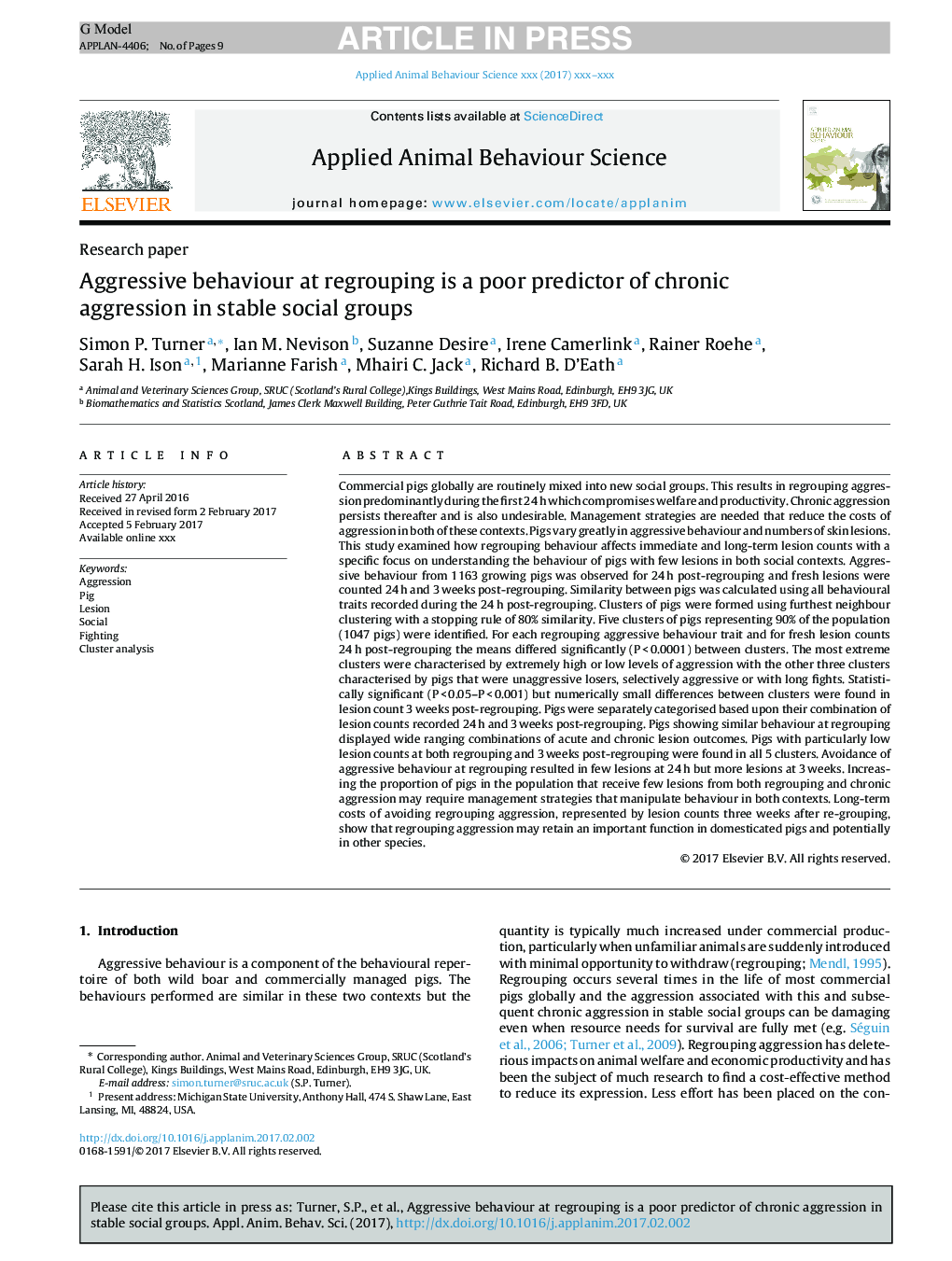| کد مقاله | کد نشریه | سال انتشار | مقاله انگلیسی | نسخه تمام متن |
|---|---|---|---|---|
| 5763427 | 1625315 | 2017 | 9 صفحه PDF | دانلود رایگان |
عنوان انگلیسی مقاله ISI
Aggressive behaviour at regrouping is a poor predictor of chronic aggression in stable social groups
ترجمه فارسی عنوان
رفتار تهاجمی در رگروپینگ یک پیش بینی ضعیف از تجاوز مزمن در گروه های اجتماعی پایدار است
دانلود مقاله + سفارش ترجمه
دانلود مقاله ISI انگلیسی
رایگان برای ایرانیان
کلمات کلیدی
پرخاشگری خوک، ضایعه، اجتماعی، مبارزه کردن، آنالیز خوشه ای،
موضوعات مرتبط
علوم زیستی و بیوفناوری
علوم کشاورزی و بیولوژیک
علوم دامی و جانورشناسی
چکیده انگلیسی
Commercial pigs globally are routinely mixed into new social groups. This results in regrouping aggression predominantly during the first 24Â h which compromises welfare and productivity. Chronic aggression persists thereafter and is also undesirable. Management strategies are needed that reduce the costs of aggression in both of these contexts. Pigs vary greatly in aggressive behaviour and numbers of skin lesions. This study examined how regrouping behaviour affects immediate and long-term lesion counts with a specific focus on understanding the behaviour of pigs with few lesions in both social contexts. Aggressive behaviour from 1163 growing pigs was observed for 24Â h post-regrouping and fresh lesions were counted 24Â h and 3Â weeks post-regrouping. Similarity between pigs was calculated using all behavioural traits recorded during the 24Â h post-regrouping. Clusters of pigs were formed using furthest neighbour clustering with a stopping rule of 80% similarity. Five clusters of pigs representing 90% of the population (1047 pigs) were identified. For each regrouping aggressive behaviour trait and for fresh lesion counts 24Â h post-regrouping the means differed significantly (PÂ <Â 0.0001) between clusters. The most extreme clusters were characterised by extremely high or low levels of aggression with the other three clusters characterised by pigs that were unaggressive losers, selectively aggressive or with long fights. Statistically significant (PÂ <Â 0.05-PÂ <Â 0.001) but numerically small differences between clusters were found in lesion count 3 weeks post-regrouping. Pigs were separately categorised based upon their combination of lesion counts recorded 24Â h and 3Â weeks post-regrouping. Pigs showing similar behaviour at regrouping displayed wide ranging combinations of acute and chronic lesion outcomes. Pigs with particularly low lesion counts at both regrouping and 3Â weeks post-regrouping were found in all 5 clusters. Avoidance of aggressive behaviour at regrouping resulted in few lesions at 24Â h but more lesions at 3Â weeks. Increasing the proportion of pigs in the population that receive few lesions from both regrouping and chronic aggression may require management strategies that manipulate behaviour in both contexts. Long-term costs of avoiding regrouping aggression, represented by lesion counts three weeks after re-grouping, show that regrouping aggression may retain an important function in domesticated pigs and potentially in other species.
ناشر
Database: Elsevier - ScienceDirect (ساینس دایرکت)
Journal: Applied Animal Behaviour Science - Volume 191, June 2017, Pages 98-106
Journal: Applied Animal Behaviour Science - Volume 191, June 2017, Pages 98-106
نویسندگان
Simon P. Turner, Ian M. Nevison, Suzanne Desire, Irene Camerlink, Rainer Roehe, Sarah H. Ison, Marianne Farish, Mhairi C. Jack, Richard B. D'Eath,
